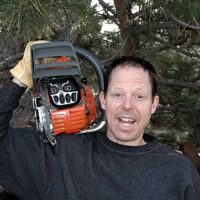So why use a battery-powered chainsaw over gas or corded models? There are several key reasons why these unconventional OPE tools are on the rise. Chiefly, new noise ordinances are driving Pros to integrate new battery-powered blowers, trimmers, and mowers into their workflow. Other reasons include the fact that battery-driven outdoor power tools are often easier, cleaner, and quieter to use than similar 2-cycle or 4-cycle products. That might make sense for you—and it might not. We’ll go over the reasons in detail so you can make an informed decision
Aside from the noise, obvious health benefits also come into play when switching to battery-powered lawn equipment. You avoid handling petrochemicals, breathing toxic exhaust fumes, and having prolonged exposure to loud engine noise. This goes triple for those using tools all day long, five days a week. And, while clean-running corded tool options exist, dragging a power cord severely compromises how you move around as you work.
Both Pros and DIYers alike already experience the convenience and simplicity of cordless tools for other tasks. Why not use battery-powered chainsaws, trimmers, and mowers as well?
Why Use a Battery-Powered Chainsaw?
Less Engine Maintenance than 2-Cycle or Gas
Small engines are notoriously finicky and often require lots of expensive maintenance over the years. This goes double if you make the common mistake of leaving fuel in them over the winter. For the average consumer, dealing with transporting, mixing, and storing gasoline is hazardous.
It also involves more time and energy compared to popping a battery into a tool. Obviously, winterizing your equipment can alleviate problems, but over time, 2-cycle engines simply have more parts to wear out.

Safer Cutting When Up High
One of the most overlooked advantages of using a battery-powered chainsaw over 2-cycle involves what happens when you’re in a tree or a lift. Typically, to communicate with your man on the ground, you must turn off the chainsaw. That also means you need to pull-start it again while at height. That’s not a recommended practice, but it’s often necessary.
With a battery-powered chainsaw, 100% of the noise output stops when you let go of the trigger. Want to give instructions to your man on the ground? Just stop cutting and talk.
Excellent power-to-weight ratios exist on some of the newer top-handle cordless chainsaws like the Makita XCU08 top handle chainsaw and the many Greenworks chainsaws. This changes the game for arborists who want to tactically integrate these battery-powered saws into their workflow.

What About the High Upfront Cost?
High upfront costs may be the chief reason why you may not want to use a battery-powered chainsaw. Tools with fuel have the edge on runtime and may remain a necessity for long workdays unless you have enough batteries to cycle. And that can be an expensive investment.
If a battery-powered toolkit seems to cost more than gas, a dealer I spoke to put it in perspective. According to him, you can figure that you’re paying all of your fuel costs upfront. You’re probably also saving all of your yearly tune-up expenses. Over time, you can probably plan on 3-years of operation before having to do significant maintenance on a battery-powered tool and/or replace the batteries.
Paying for the electricity to charge batteries almost seems negligible compared to the price of gallons of fuel. If you can choose products that give you the run-time you need, or even integrate solar charging into the equation, you may find that you can save a significant amount on operating costs over those three years.
Gateway Tools
Of course, manufacturers hope that buyers invest in more than one of their tools. Once you have a charger and batteries, buying bare tools after that could mean significant savings over the 2-cycle competition. It’s easy to see the utility of starting out with a cordless string trimmer, then adding a chain saw, blower, etc, that can share the same battery packs.

The Bottom Line on Why to Use a Battery-Powered Chainsaw Over Gas
Why use a battery-powered chainsaw? At the end of the day, it comes down to less noise and more convenience.
We also cannot ignore reduced maintenance and no exposure to petrochemicals. While you may pay more upfront, you stand to gain some cost savings. All-but eliminating fuel, oil, and potential repair/maintenance charges adds up quickly. There are more powerful chainsaws with larger bars in the gas realm, but cordless is maturing. We feel it has now reached a point where it’s a legitimate option for both property owners and Pros.



